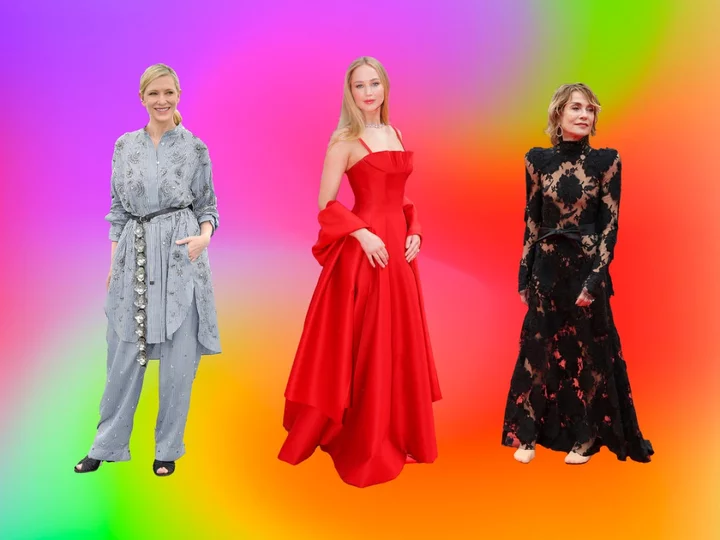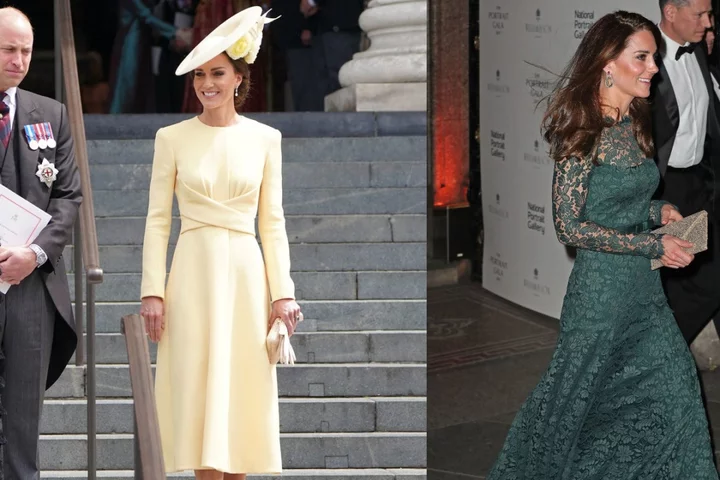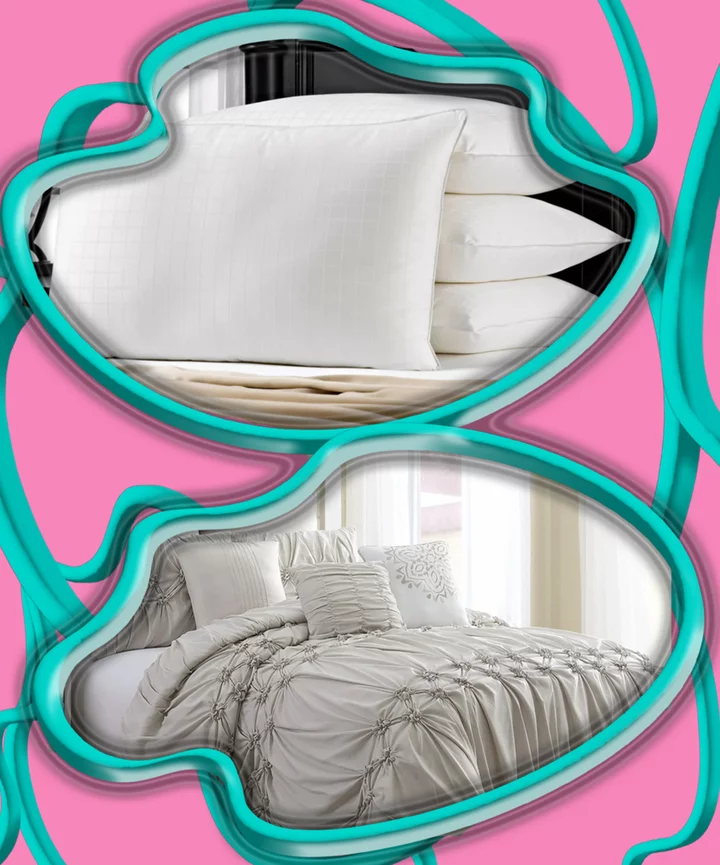Flip-flops, nudity and ‘up the vajayjay!’: How the red carpet became a platform for protest
Of all the places you’d expect to see a woman walking barefoot, the red carpet at the Cannes Film Festival is probably not one of them. And yet, this has become a somewhat regular occurrence at the annual shindig, where A-list actors, models and directors gather in their finest gladrags. Sure, the festival is ostensibly about celebrating the best of cinema. But it has also become one of the most significant events in the fashion calendar, with stars taking the opportunity to make both sartorial and political statements. However, out of all the trends that have prevailed, from cutout gowns to sheer sequins, the one that continually seems to trump them all is none other than women’s feet. And it’s already made headlines again this year, thanks to the likes of Natalie Portman, Jennifer Lawrence and Isabelle Huppert, all of whom have made their own subtle nods to the political powers of their own feet. Traditionally, the Cannes dress code is rather strict: in 2015, a group of women in their fifties were reportedly turned away from a screening because they were wearing “rhinestone flats” instead of high heels. The story immediately prompted a backlash and accusations of sexism, with the festival’s director, Thierry Frémaux, denying that heels are mandatory: “The rumour saying the festival insists on high heels for women on the red carpet is unfounded,” he wrote in response to critics on Twitter. Nonetheless, female actors were quick to respond, with Emily Blunt saying at the time: “Everyone should wear flats, to be honest. We shouldn’t wear high heels.” The following year, Julia Roberts and Sasha Lane attended Cannes events barefoot. “The carpet was for our film and I was dressed in a very elegant gown and there’s a ton of stairs, and I’m walking around all day… so I will go barefoot,” Lane said in a later interview. “Why is anyone against that? I’m still here and well-dressed.” Lane’s comments were also echoed by Kristen Stewart, who once said of strict female dress codes: “I feel like you can’t ask people that anymore. If you’re not asking guys to wear heels and a dress, you cannot ask me either.” The Twilight star famously took off her sky-high Christian Louboutin heels on the red carpet at Cannes in 2018, proceeding to walk the rest of the carpet barefoot. Official rule or not, there’s no mistaking that even now, in 2023, the pressures placed on women at black tie events such as Cannes are different to those placed on men. Sartorial convention has long defined occasionwear as anything that leaves your feet uncomfortable. Whether it’s a pump, sandal, or stiletto, the shoe needs to add some sort of height to your look in order to be considered formal and appropriate. It might seem like a small imposition, but if there’s anything this year’s red carpet has taught us, it’s that it can serve as a microcosm of much wider inequalities. Take Cate Blanchett, who last weekend at a Cannes party presented an award to the French-Iranian star Zahra Amir Ebrahimi. “I am going to take my heels off, in honour of the women of Iran,” she told the crowd, before holding up Ebrahimi’s pointed trophy to joke: “This is to stab everyone who stands in the way of women’s rights. Up the vajayjay!” The sentiment has also been referenced by Portman, Lawrence and Huppert at this year’s festival. On Saturday, while talking about her new film May December, Portman spoke about the idea of “performing femininity”, telling attendees that it’s something she’s “very curious about”. “The different ways that we as women are expected to behave – at this festival, even – compared to men,” she said. “How we’re supposed to look, how we’re supposed to carry ourselves.” Meanwhile, Lawrence arrived on the red carpet for the Bread and Roses premiere in a scarlet Dior gown paired with flip-flops. And as for Huppert, a perennial style maven at Cannes and beyond, she made a subtle nod to the shoe-less protests in a pair of Balenciaga heels that had been specially designed to resemble a bare foot. All this serves as a reminder that despite societal progressions, women’s bodies are still firmly policed in the public eye. If it’s not via their footwear, it’s via their actual outfits. Think supermodel Irina Shayk, whose outfits at Cannes events this year include a leather two-piece by Mowalola that exposed her entire torso, and a sheer black dress worn over a matching set of Gucci underwear. Elsewhere, we’ve seen Julia Fox don a completely see-through bodice with a white flowing skirt, while Naomi Campbell walked the red carpet in a scarlet gown with cutouts across her chest. Showing skin is nothing new among the fashion set, particularly given the resurgence of Y2K trends on the runways that continues to maintain its stronghold on the industry. (There has been talk of “naked dresses” for several seasons now, with influencers and stars all partaking in the art of wearing sheer gowns to formal affairs.) But bringing it to Cannes feels particularly poignant and in keeping with the barefoot brouhaha when you consider just how easily offended people are by such ensembles. The body-shaming prompted by Florence Pugh’s see-through Valentino frock last summer is just one example that springs to mind. Flashing a foot is, of course, somewhat different to flashing a nipple, but fundamentally the underlying message is the same. It’s about subverting the social conventions that oppress us. It’s about showing the world that women are fed up of being told what is and is not an acceptable way of presenting their bodies. And it’s about asking why we should still conform to dress codes informed by sexism when, as Blanchett pointed out, women’s rights continue to be subjugated around the world. With all this in mind, we’re not asking for much. The least people can allow us is to take off our heels or flash a little flesh without it having to be headline news. Read More Subversive? Dangerous? Boring?: How the red carpet became a barometer for modern masculinity Hostage to fashion: Margot Robbie’s Chanel problem speaks to a wider red carpet crisis Can casual sex ever really be casual? All the best-dressed stars at the 2023 Cannes Film Festival Jennifer Lawrence stuns at Cannes Film Festival in red Dior gown - and flip-flops Amber Heard supporters react to Johnny Depp’s Cannes welcome

Of all the places you’d expect to see a woman walking barefoot, the red carpet at the Cannes Film Festival is probably not one of them. And yet, this has become a somewhat regular occurrence at the annual shindig, where A-list actors, models and directors gather in their finest gladrags.
Sure, the festival is ostensibly about celebrating the best of cinema. But it has also become one of the most significant events in the fashion calendar, with stars taking the opportunity to make both sartorial and political statements. However, out of all the trends that have prevailed, from cutout gowns to sheer sequins, the one that continually seems to trump them all is none other than women’s feet. And it’s already made headlines again this year, thanks to the likes of Natalie Portman, Jennifer Lawrence and Isabelle Huppert, all of whom have made their own subtle nods to the political powers of their own feet.
Traditionally, the Cannes dress code is rather strict: in 2015, a group of women in their fifties were reportedly turned away from a screening because they were wearing “rhinestone flats” instead of high heels. The story immediately prompted a backlash and accusations of sexism, with the festival’s director, Thierry Frémaux, denying that heels are mandatory: “The rumour saying the festival insists on high heels for women on the red carpet is unfounded,” he wrote in response to critics on Twitter.
Nonetheless, female actors were quick to respond, with Emily Blunt saying at the time: “Everyone should wear flats, to be honest. We shouldn’t wear high heels.” The following year, Julia Roberts and Sasha Lane attended Cannes events barefoot. “The carpet was for our film and I was dressed in a very elegant gown and there’s a ton of stairs, and I’m walking around all day… so I will go barefoot,” Lane said in a later interview. “Why is anyone against that? I’m still here and well-dressed.”
Lane’s comments were also echoed by Kristen Stewart, who once said of strict female dress codes: “I feel like you can’t ask people that anymore. If you’re not asking guys to wear heels and a dress, you cannot ask me either.” The Twilight star famously took off her sky-high Christian Louboutin heels on the red carpet at Cannes in 2018, proceeding to walk the rest of the carpet barefoot.
Official rule or not, there’s no mistaking that even now, in 2023, the pressures placed on women at black tie events such as Cannes are different to those placed on men. Sartorial convention has long defined occasionwear as anything that leaves your feet uncomfortable. Whether it’s a pump, sandal, or stiletto, the shoe needs to add some sort of height to your look in order to be considered formal and appropriate. It might seem like a small imposition, but if there’s anything this year’s red carpet has taught us, it’s that it can serve as a microcosm of much wider inequalities.
Take Cate Blanchett, who last weekend at a Cannes party presented an award to the French-Iranian star Zahra Amir Ebrahimi. “I am going to take my heels off, in honour of the women of Iran,” she told the crowd, before holding up Ebrahimi’s pointed trophy to joke: “This is to stab everyone who stands in the way of women’s rights. Up the vajayjay!”
The sentiment has also been referenced by Portman, Lawrence and Huppert at this year’s festival. On Saturday, while talking about her new film May December, Portman spoke about the idea of “performing femininity”, telling attendees that it’s something she’s “very curious about”. “The different ways that we as women are expected to behave – at this festival, even – compared to men,” she said. “How we’re supposed to look, how we’re supposed to carry ourselves.”
Meanwhile, Lawrence arrived on the red carpet for the Bread and Roses premiere in a scarlet Dior gown paired with flip-flops. And as for Huppert, a perennial style maven at Cannes and beyond, she made a subtle nod to the shoe-less protests in a pair of Balenciaga heels that had been specially designed to resemble a bare foot.
All this serves as a reminder that despite societal progressions, women’s bodies are still firmly policed in the public eye. If it’s not via their footwear, it’s via their actual outfits. Think supermodel Irina Shayk, whose outfits at Cannes events this year include a leather two-piece by Mowalola that exposed her entire torso, and a sheer black dress worn over a matching set of Gucci underwear. Elsewhere, we’ve seen Julia Fox don a completely see-through bodice with a white flowing skirt, while Naomi Campbell walked the red carpet in a scarlet gown with cutouts across her chest.
Showing skin is nothing new among the fashion set, particularly given the resurgence of Y2K trends on the runways that continues to maintain its stronghold on the industry. (There has been talk of “naked dresses” for several seasons now, with influencers and stars all partaking in the art of wearing sheer gowns to formal affairs.) But bringing it to Cannes feels particularly poignant and in keeping with the barefoot brouhaha when you consider just how easily offended people are by such ensembles. The body-shaming prompted by Florence Pugh’s see-through Valentino frock last summer is just one example that springs to mind.
Flashing a foot is, of course, somewhat different to flashing a nipple, but fundamentally the underlying message is the same. It’s about subverting the social conventions that oppress us. It’s about showing the world that women are fed up of being told what is and is not an acceptable way of presenting their bodies. And it’s about asking why we should still conform to dress codes informed by sexism when, as Blanchett pointed out, women’s rights continue to be subjugated around the world.
With all this in mind, we’re not asking for much. The least people can allow us is to take off our heels or flash a little flesh without it having to be headline news.
Read More
Subversive? Dangerous? Boring?: How the red carpet became a barometer for modern masculinity
Hostage to fashion: Margot Robbie’s Chanel problem speaks to a wider red carpet crisis
Can casual sex ever really be casual?
All the best-dressed stars at the 2023 Cannes Film Festival
Jennifer Lawrence stuns at Cannes Film Festival in red Dior gown - and flip-flops
Amber Heard supporters react to Johnny Depp’s Cannes welcome









